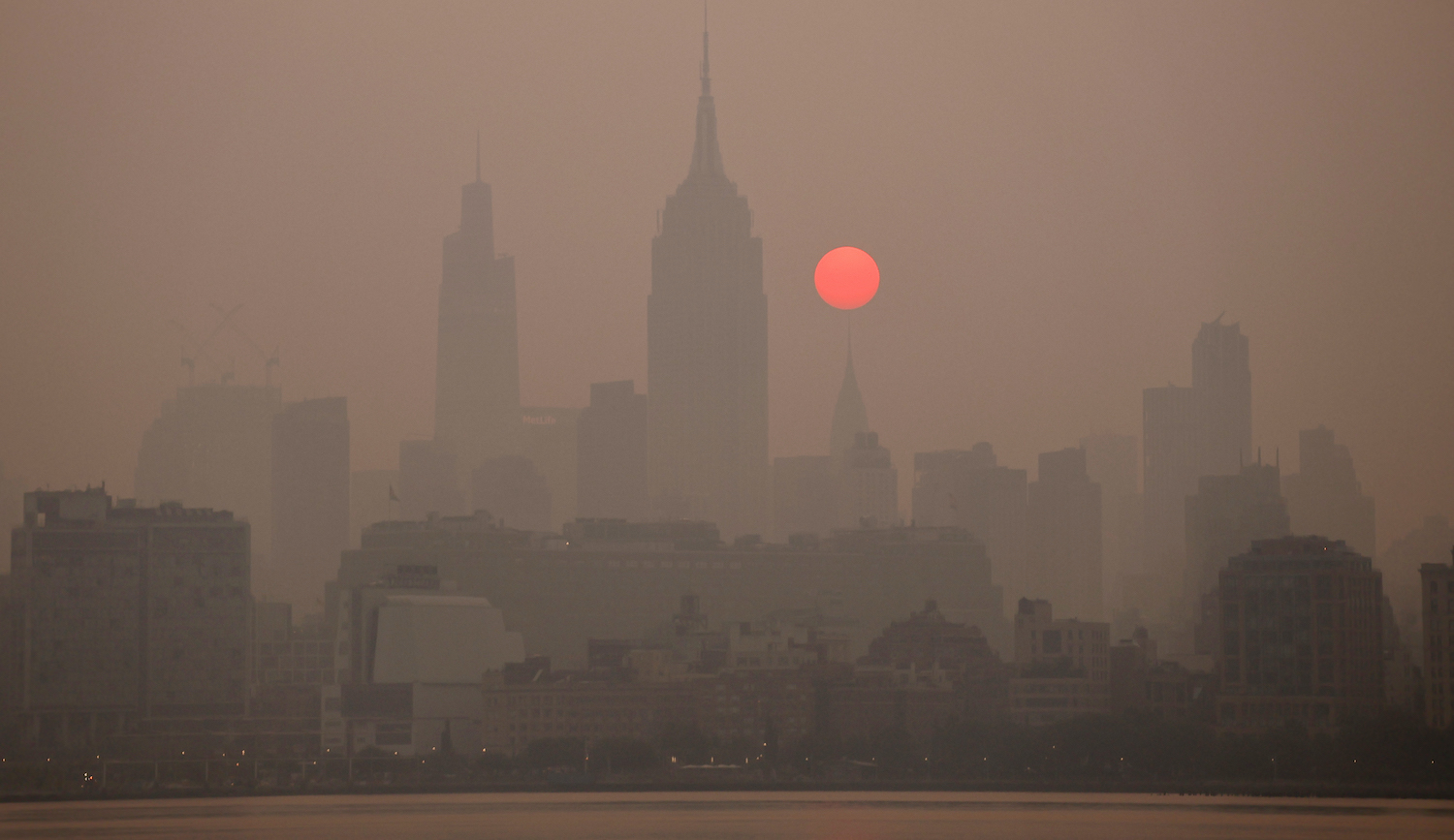This week, smoke from a series of wildfires in southwestern Quebec was pushed south and east by a storm system off the coast of Nova Scotia, blanketing major cities in the United States in a thick, toxic quilt. New York City residents awoke on Wednesday to find that they suddenly lived in Mordor, as did Philadelphians, Washingtonians, and millions more on the East Coast who lived under the hateful orange shadow of the expanding plume. Ash fell on cars thousands of miles away from the fires' sources, and the region was home to the worst air quality in the world earlier this week, with the apocalyptic sky tinted the same ominous color that San Francisco infamously experienced in September 2020. What sentiment can Americans express in reaction to the conditions in New York, vis-a-vis California's own smoky history? For a concerning number of people, on both sides of the country, the answer to that has been to call, "Scoreboard!"
California had it worse, go some of the complaints, so shut up and take it. Where was the national media's East Coast ass, others say, when our forests were aflame? Some East Coast types countered with You don't see us whining when our air is bad, unlike you. While I am sure you can chalk a good deal of this effluvia up to the broader noxiousness of end-times Twitter, I think the common thread that unites all those nasty sentiments is worth taking seriously. Processing something as big and thorny and terrifying as global warming through the prism of cultural grievance is not a distinctly online feature, after all. It's a key component of a badly broken discourse, and a serious obstacle to thinking about this challenge in a useful way.
What the Californians aggrieved at what they see (incorrectly!) as an attention deficit and the New Yorkers smirking at their own toughness for poisoning themselves without complaint have in common is that they seem to conceive of the Quebec wildfires and the California fires of yore as, A) wholly distinct regional phenomena, and B) something out of our control. If generational mega-fires can be flattened and (I am sorry to use this word) normalized into being understood to be as mundane as the weather, then they are merely things that happen in different ways to people who live in different places. Not trivial, exactly, but somehow inherent and specific and immutable, to be argued about as such. And so a towering crisis shrinks to the size and significance of some playfight over burritos or bagels or pizza, to be fought over with all the American-ass moral righteousness and overheated competitive spirit that sours any of those other debates.
To a certain degree, the fires themselves really are distinct and it is worth taking their differences seriously. Like the 2020 California fires, the 2023 Quebec fires were sparked by lightning strikes, though the Quebec fires happened further from major population centers (especially the major population centers currently being smoked out) while many of California's most destructive fires of the past half-decade have burnt right outside of cities like Santa Cruz, Santa Barbara, and Napa. The fires have a different seasonality to them, too, burning earlier in Canada and later in the summer down in California; this is why so many American firefighters are up in Canada right now. The particularities of pre-fire forest management and the evils of PG&E are also factors here, and important if only because they foreground that this is not all a purely natural phenomenon.
All that said, the differences are less important than their similarities. Both suites of conflagrations are burning faster and hotter through drier forests, generating bigger plumes of more harmful smoke. You do not need to zoom out very far to find a common root between the fires: the first word in "global warming" is "global." Climate change is a planet-level problem, and though its effects will be different in different parts of the world, dealing with it in any sort of humane way will necessarily require orders of magnitude more solidarity than what we have now. The very least we can do is recognize that the New Yorkers who can't breathe today and the Californians who won't be able to breathe this coming October (or whenever the next big fire hits) are both victims of the same circumstance, and the same set of social failures. How can you fight together if you can't agree on the enemy? What oil executive wouldn't want everyone bickering amongst themselves in this particular way, especially if the alternative was training their fire on the actual authors of the crisis, or those failing to manage its effects further downstream?
Billionaires are buying remote strongholds in New Zealand and Eastern European countries are brutalizing climate refugees, while the ascendant American right wing is going fortress mode. Locking your own shit down at the expense of the unlucky many who will suffer the worst of the ongoing climate catastrophe is a reactionary move, but it is also fundamentally a defeatist one. As such, it's an impulse that must resisted if humanity wants to solve this mess, or simply survive it with some grace. That is why it is so depressing to see people who are all victims of the same sprawling social crimes bickering over whose sky is more orange. We may not necessarily be able to opt out of being the proverbial frog slowly boiling to death, but we should at least be clearheaded enough to see the scope of the problem.






